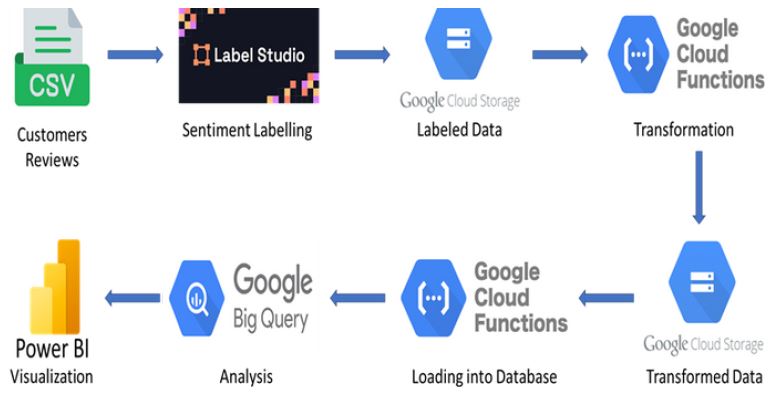Analyzing Restaurant Reviews: Unveiling Sentimental Insights in Customer Feedback
motivitylabs
July 28, 2023
Analyzing Restaurant Reviews: Unveiling Sentimental Insights in Customer Feedback


Sentiment analysis, a powerful tool for understanding customer feedback, plays a crucial role in today’s digital landscape. This case study focuses on sentiment analysis within the Scope restaurant context, aiming to extract valuable insights from customer reviews.
To perform sentiment analysis and provide sentiment labels for a large dataset of customer feedback for a restaurant, leveraging cloud-based solutions for efficient processing and analysis.

Data Collection: In the data collection phase, a diverse range of data, such as customer reviews or social media posts, is gathered from multiple sources.
Data Labeling: Data labeling involves the manual assignment of sentiment labels (positive, negative, neutral) to each data point in the collected dataset.
Data Transformation: After data annotation, the next step in data transformation is selecting the most useful and relevant information for further analysis.
Data Analysis: In the data analysis phase, we perform a comprehensive examination of the transformed dataset to extract valuable insights.
Visualization: Visualization is a powerful tool in sentiment analysis, presenting sentiment-related insights in a visually intuitive manner.


This case study showcased the application of sentiment analysis in analyzing restaurant reviews for Scope Restaurant. By following a systematic approach of data collection, labeling, transformation, and analysis, valuable insights were obtained regarding customer sentiments. The findings can be used to enhance customer satisfaction, identify areas for improvement, and make informed decisions. While challenges like human labeling and automation persist, sentiment analysis remains a valuable tool for driving data-driven decision-making and improving customer experiences in the restaurant industry.
5525 N MacArthur Blvd Suite, #690, Irving TX 75038
1223 Brickell Centre, Miami, Florida, 33131, USA
Dallas Center, 6th & 7th Floor, 83/1, Plot No. A1, Knowledge City Rd, Rai Durg, Hyderabad, Telangana 500032
7003 Steeles Ave, West, Unit #7 (1st Floor) Toronto, ON M9W 0A2.
USA Enquiry: +1 214-776-6158
India Enquiry: +91 40 4651 5454
Canada Enquiry: +1 437-562-6565
Motivity Labs is an award-winning IT Services company that focuses on Cloud, Mobile, Big data, and Innovation.
Our dedicated focus and forward-thinking vision have empowered Motivity Labs to rapidly scale up our operations. Because of this, Industry leaders named Motivity Labs as one of the fastest-growing privately held companies in the U.S. for four consecutive years. Likewise, Motivity Labs ranked #11 on Top 20 IT Service Companies, #12 on Top 20 Texas companies, and #8 in the Dallas Metro service area.
Motivity Labs successfully solves the issues of Fortune 500 companies across various industries. In conclusion, our global expertise in Mobile, Cloud, Big Data, and Agile execution allows us to take on any challenge.
@2025 Motivity Labs. All Rights Reserved.
Get notified about new articles